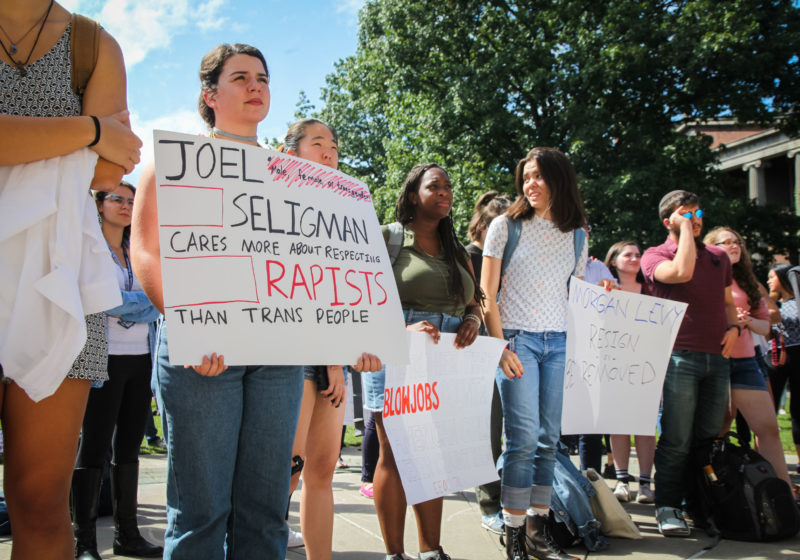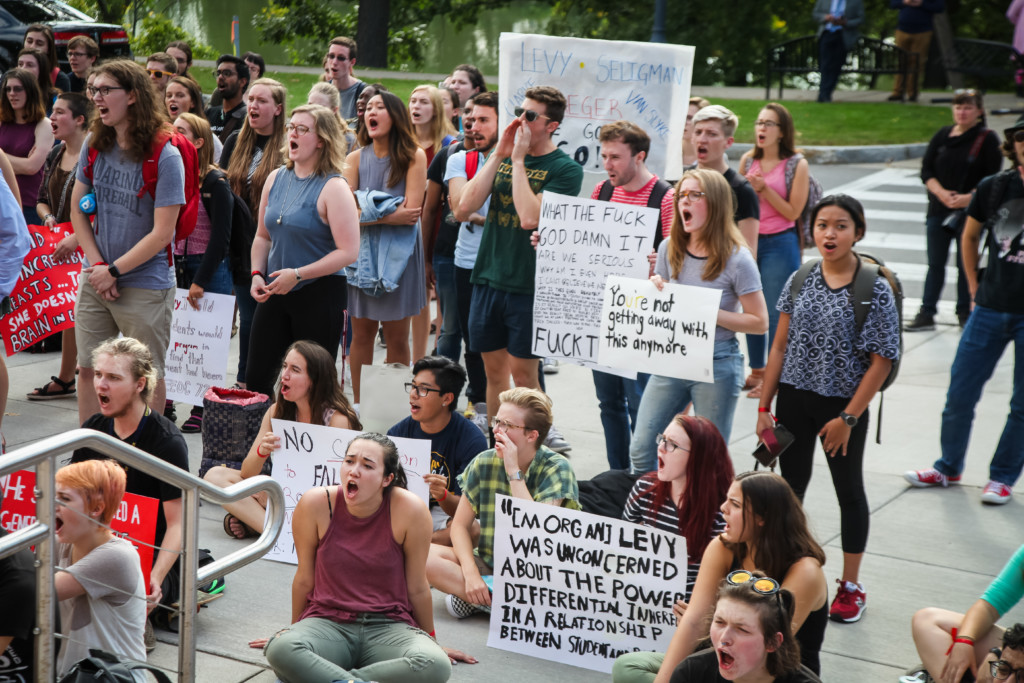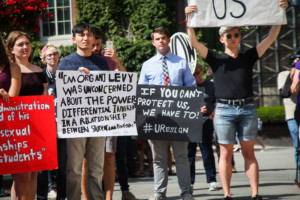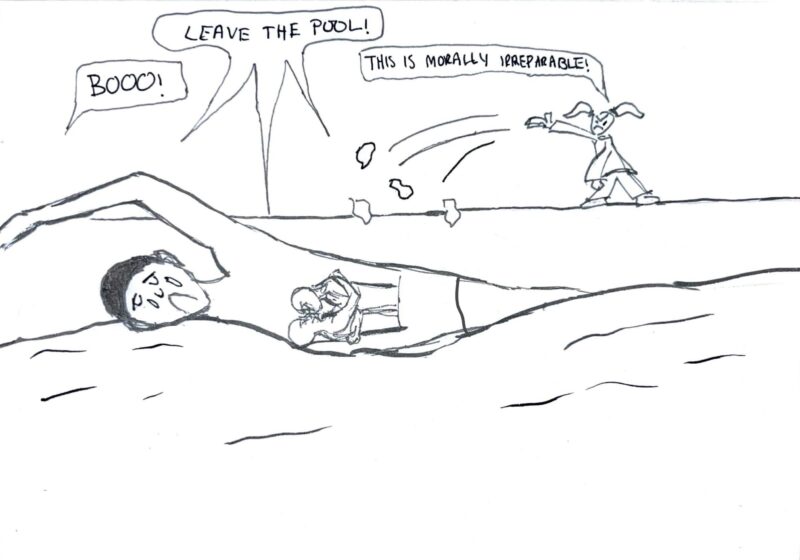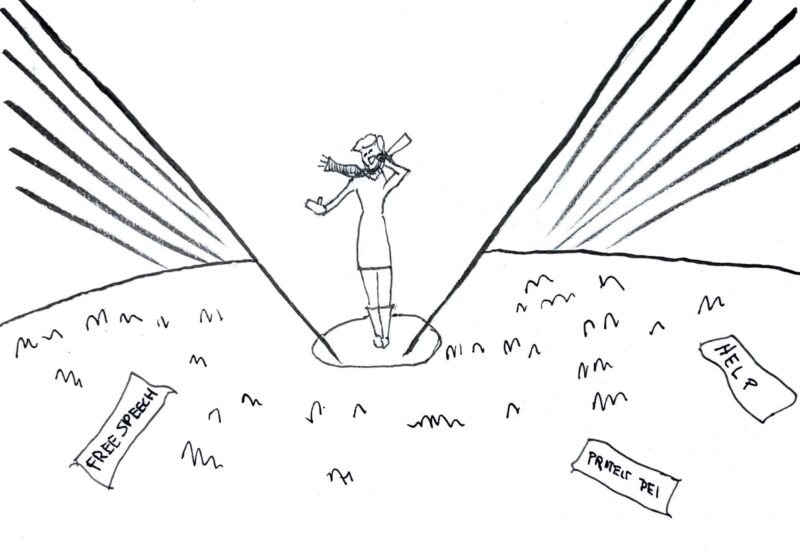Morgan Levy resigned in September. Her reasons for doing so are covered here.
Levy’s departure is a reminder to some of a larger trend — the mass exodus of the key players in 2017’s Jaeger scandal.
Some students will remember Levy as the Title IX coordinator throughout the Jaeger scandal, where she had a hand in some of the investigations surrounding BCS professor T. Florian Jaeger. When several professors filed an Equal Employment Opportunity Commission complaint, stating that they’d reported sexual harassment to UR and UR retaliated against them, students rallied for her resignation, frustrated that she didn’t do enough given her position.
Joel Seligman is no longer president. The complainants have all left. Now Levy’s gone, too.
As the scandal has faded into history and the major characters made their exit, other administrators and faculty who had little to no connection to the incidents are still around. Yet the student leaders who organized the protests, who called for resignations, who briefly brought UR national negative attention, are mostly gone.
When the class of 2021 graduates, there will be no students left who were here when Mother Jones broke the story on the EEOC complaint. No students who witnessed a classmate’s hunger strike. No students who remember Seligman announcing his resignation the day the Mary Jo White report came out. No students who attended when the Faculty Senate censured Jaeger.
Most of us writing this Ed Board weren’t even here for the scandal; we primarily know of the Jaeger incidents after the fact from reading the Campus Times coverage.
That’s the inherent problem with college student activism: Every four years, you have an entirely new crew. You can’t sustain a movement when the leaders keep leaving, taking with them the memories of meetings with faculty, the years of work they put in, and the knowledge they never wrote down. But it’s not just the leaders; it’s the everyday students who supported, or at least knew about, the movement.
Administration knows this. Just look at what happened with the Department of Public Safety. They introduced policies that increase the militarization of DPS, but incrementally over years and years so that the students who raised concerns for the first changes weren’t around for the second. This probably wasn’t the only factor — as we all know, bureaucracies take two weeks to schedule a meeting — but we’re betting money the delays were strategic. By the time they attempted to further arm DPS in 2018, half of the student body was oblivious to the previous effort in 2016.
This pattern could kill the flag display in Hirst Lounge, too, if we aren’t vigilant. After the class of 2023 leaves, who will be left who knows what Hirst Lounge used to hold? Who will know what it used to symbolize and who will feel the nostalgia for the flag display of years past?
It’s easy to rewrite policies in the wake of bad things happening, but if Jaeger doesn’t face any consequences other than attending a few One Community dialogues, the policy changes are arbitrary. It seems that the University’s only sympathy lies with him, and not with the people he hurt.
What does that say about how UR will handle future harassment cases? What does that say about how they’re handling those cases right now? How are students supposed to change that when we’re graduating faster than the University can fire a single sexual harasser?
If the administration doesn’t want to implement student demands, all they have to do is play the waiting game.
As an organization, the CT tries to document these moments — a search through our archives will yield plenty of stories and opinions detailing the Jaeger scandal, flag lounge controversies, and the opposition to arming DPS. But will we be able to recover the spirit of those moments years from now? The drive and urgency to change things for the better?
Student activism can only get us so far. It can force the University to compromise on arming DPS, for example. But faculty and staff will be here for more than four years, so they need to keep up the pressure and remember the still-unaddressed issues. And administrators need to stay away from unpopular incremental change.
The Editorial Board is a weekly Opinions article representing the view of the Campus Times, co-written by Editor-in-Chief Hailie Higgins, Publisher An Nguyen, Managing Editor Corey Miller-Williams, Features Editor Micah Greenberg, and Opinions Editor Lucy Farnham.
